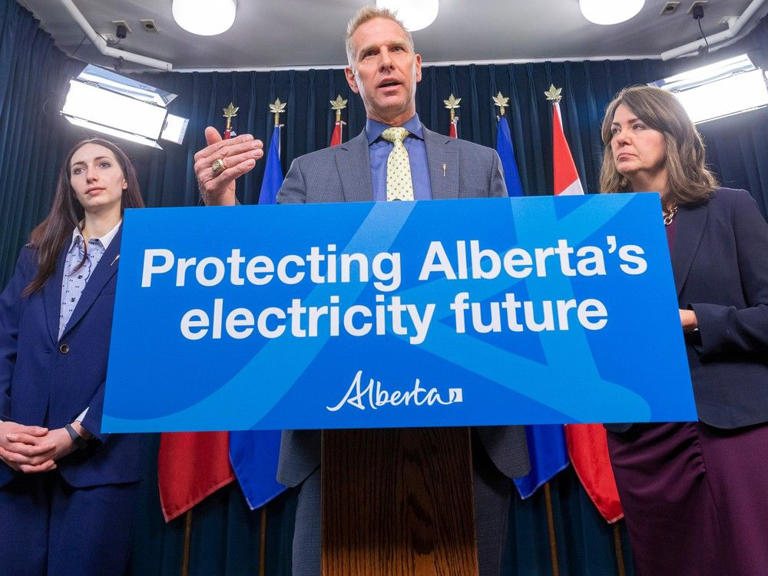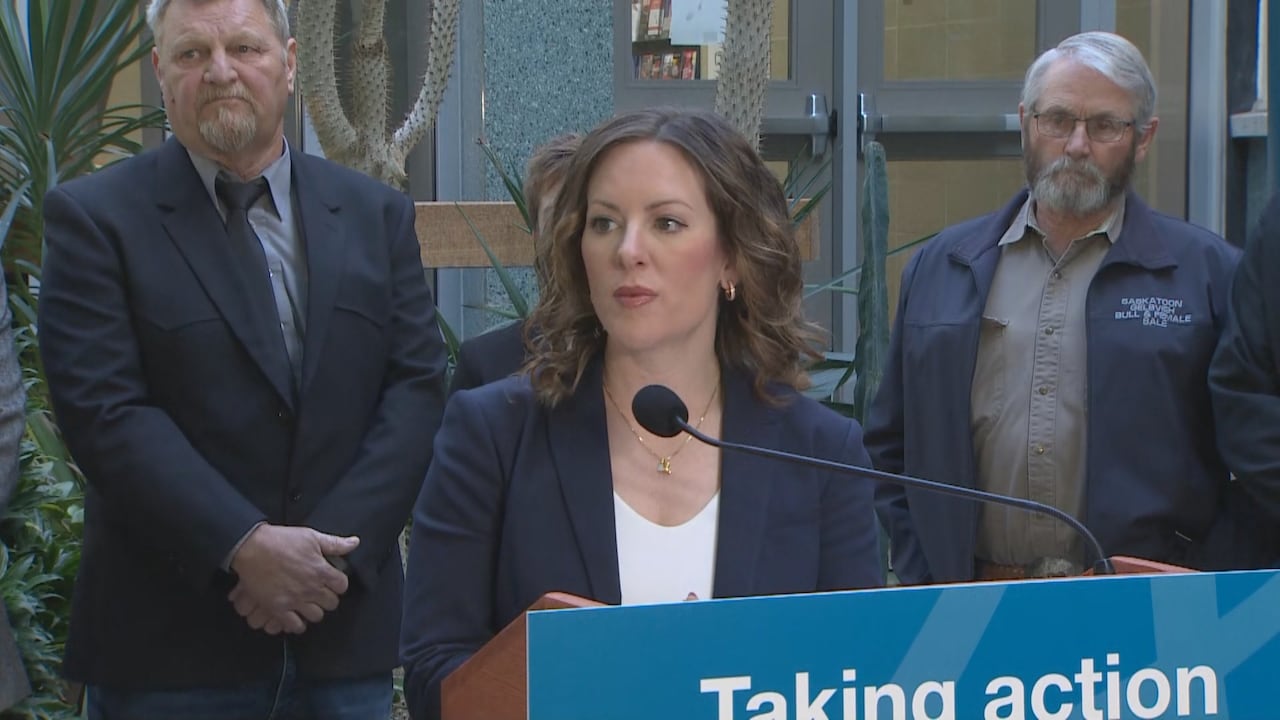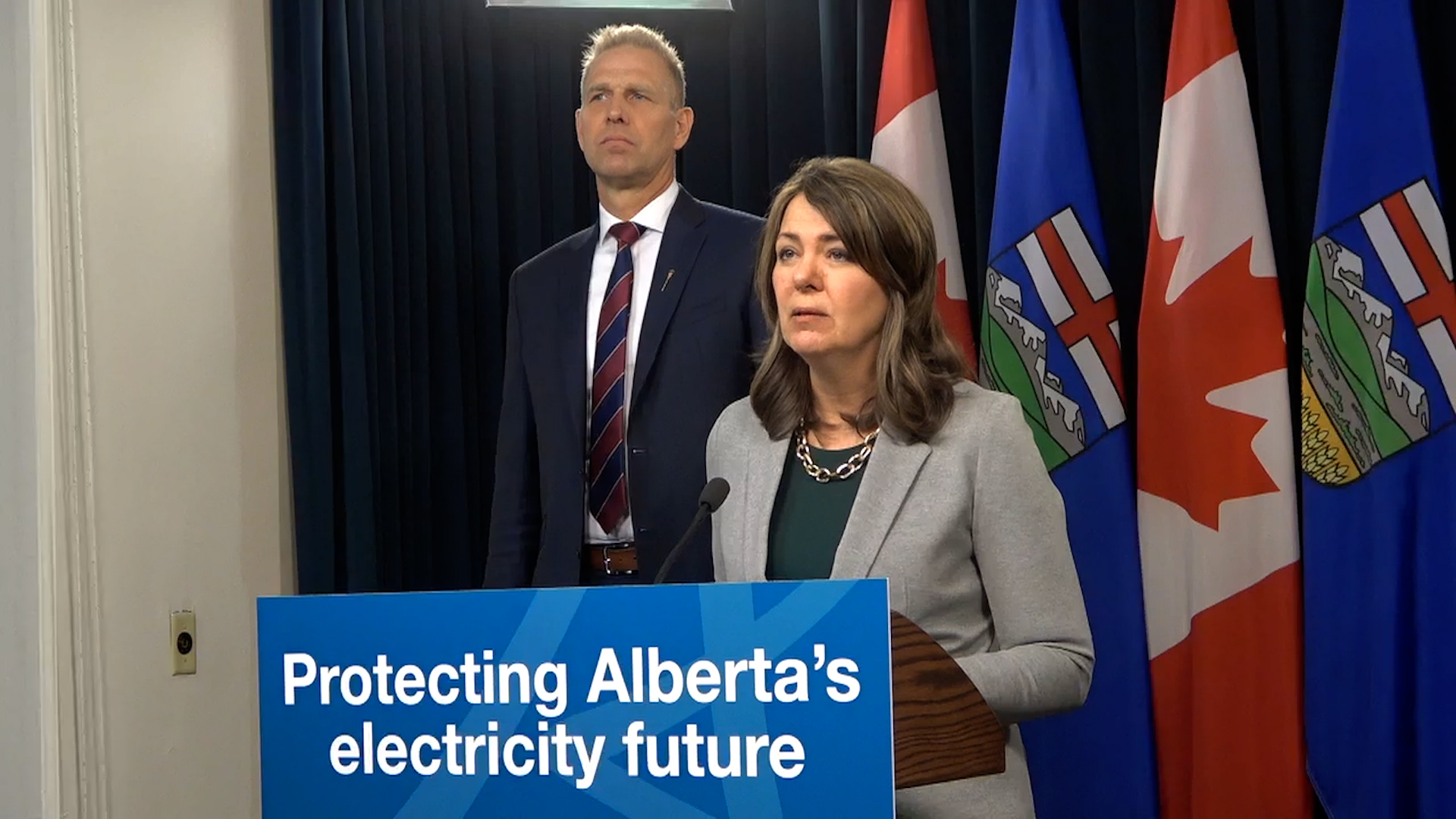Story by Matthew Black • Edmonton Journal

Affordability and Utilities Minister Nathan Neudorf speaks as Parliamentary Secretary for Affordability and Utilities Chantelle De Jonge, left, and Premier Danielle Smith listen as he introduces legislation to lower fees for utility bills and help to keep people more informed about their options on Monday, April 22, 2024, in Edmonton.
© Provided by Edmonton Journal
The Alberta government is introducing new legislation that will standardize how municipalities are allowed to calculate franchise fees on electricity bills, in a move it says will prevent spikes in power prices, particularly in the city of Calgary.
The changes will be implemented via Bill 19 — the Utilities Affordability Statutes Amendment Act, 2024 — introduced in the legislature on Monday.
It proposes amendments to three existing pieces of legislation, and mandates that local access fees not be tied to the default rate, as is in part the case in Calgary, and rather be tied to consumption, as done by Edmonton and other municipalities, or as a percentage of transmission and distribution costs.
Affordability and Utilities Minister Nathan Neudorf said the bill primarily impacts Calgary, which is the only municipality to incorporate the default rate into its fee calculation.
But, the new bill is also intended to block other municipalities from adopting Calgary’s approach and switching to the market rate, something he said would bolster a municipality’s treasury but at the expense of taxpayers.
“We are aware of other municipalities, in large part due to the windfall profits Calgary saw, that are contemplating making those changes themselves. This is clarifying that this is not the avenue for them to seek those kinds of funds,” he said.

Global News Southern Alberta stakeholders sign historic water-sharing agreement
1:46

cbc.ca Alberta takes on drought challenges with historic water sharing agreement
2:51
The Alberta government is introducing new legislation that will standardize how municipalities are allowed to calculate franchise fees on electricity bills, in a move it says will prevent spikes in power prices, particularly in the city of Calgary.
The changes will be implemented via Bill 19 — the Utilities Affordability Statutes Amendment Act, 2024 — introduced in the legislature on Monday.
It proposes amendments to three existing pieces of legislation, and mandates that local access fees not be tied to the default rate, as is in part the case in Calgary, and rather be tied to consumption, as done by Edmonton and other municipalities, or as a percentage of transmission and distribution costs.
Affordability and Utilities Minister Nathan Neudorf said the bill primarily impacts Calgary, which is the only municipality to incorporate the default rate into its fee calculation.
But, the new bill is also intended to block other municipalities from adopting Calgary’s approach and switching to the market rate, something he said would bolster a municipality’s treasury but at the expense of taxpayers.
“We are aware of other municipalities, in large part due to the windfall profits Calgary saw, that are contemplating making those changes themselves. This is clarifying that this is not the avenue for them to seek those kinds of funds,” he said.

Global News Southern Alberta stakeholders sign historic water-sharing agreement
1:46

cbc.ca Alberta takes on drought challenges with historic water sharing agreement
2:51

The Canadian Press Alberta announces plan to protect consumers against power price spikes
2:11
The government claims Edmontonians paid an average of $75 on average in local access fees over 2023 via Epcor, with Calgarians paying more than triple that, at $240 on average, via Enmax.
That difference resulted in $186 million more in fees collected by the City of Calgary than anticipated, according to the province’s analysis.
“It is unacceptable for municipalities to be raking in hundreds of millions of dollars of surplus revenue off the backs of Albertans tying their fees to that variable rate,” Neudorf said.
Calgary city council has eyed moving to a consumption-only model , but not until 2027, which Neudorf said is too far away.
On Monday, Calgary councillors were slated to hear from hundreds of members of the public regarding proposed blanket rezoning changes.
Calgary Mayor Jyoti Gondek said in a statement that the bill explicitly targets Calgary for work it already has underway, stating, “it’s nice that the province is finally paying attention to this.”
“Any changes to local access fees are governed by the Alberta Utilities Commission (AUC) which is in minister Neudorf’s portfolio,” it reads. “The AUC is the reason council couldn’t just flip a switch and make a change to the fees.”
Local access fees
Utility retailers pay a linear tax and franchise fee for the right to use a municipality’s property to exclusively operate. Together, those costs are labelled as a local access fee which is paid to the municipality by the utility retailer who recoups that cost from customers through monthly bills.
Under existing rules, the AUC must approve electricity rates which are not allowed to exceed 20 per cent of the distribution charge, though municipally-owned subsidiaries in Calgary (Enmax) and Edmonton (Epcor) are exempt from needing that approval.
Bill 19 aims to change that exception, and would require AUC oversight for all such agreements.
Pre-exiting agreements continue in effect until they are approved by the AUC or 270 days after Bill 19 comes into force, whichever happens sooner.
The legislation also does not affect Medicine Hat, which generates its own power and owns the distribution system.
RRO name change to be formalized
The new legislation, if passed, would also formalize the name change to the default electricity rate announced by Premier Danielle Smith last week .
The rate was previously known as the regulated rate option but will be renamed as the rate of last resort, with Smith calling the old title “misleading.”
Around three in 10 Albertans are on the default rate, which changes based on market prices. It’s used by customers who don’t sign a contract with a retailer either because they don’t have a sufficient credit score to do so, or because they don’t realize they are on the default rate.
Opposition energy critic Nagwan Al-Guneid said Monday’s bill came three years too late.
“The United Conservative Party is introducing legislation effectively three years too late to save Albertans from volatile utility rates,” she stated.
“The UCP is essentially closing the barn door after the horses have bolted, as it will not help Albertans who have no choice but to remain on the regulated rate option.”
mblack@postmedia.com
2:11
The government claims Edmontonians paid an average of $75 on average in local access fees over 2023 via Epcor, with Calgarians paying more than triple that, at $240 on average, via Enmax.
That difference resulted in $186 million more in fees collected by the City of Calgary than anticipated, according to the province’s analysis.
“It is unacceptable for municipalities to be raking in hundreds of millions of dollars of surplus revenue off the backs of Albertans tying their fees to that variable rate,” Neudorf said.
Calgary city council has eyed moving to a consumption-only model , but not until 2027, which Neudorf said is too far away.
On Monday, Calgary councillors were slated to hear from hundreds of members of the public regarding proposed blanket rezoning changes.
Calgary Mayor Jyoti Gondek said in a statement that the bill explicitly targets Calgary for work it already has underway, stating, “it’s nice that the province is finally paying attention to this.”
“Any changes to local access fees are governed by the Alberta Utilities Commission (AUC) which is in minister Neudorf’s portfolio,” it reads. “The AUC is the reason council couldn’t just flip a switch and make a change to the fees.”
Local access fees
Utility retailers pay a linear tax and franchise fee for the right to use a municipality’s property to exclusively operate. Together, those costs are labelled as a local access fee which is paid to the municipality by the utility retailer who recoups that cost from customers through monthly bills.
Under existing rules, the AUC must approve electricity rates which are not allowed to exceed 20 per cent of the distribution charge, though municipally-owned subsidiaries in Calgary (Enmax) and Edmonton (Epcor) are exempt from needing that approval.
Bill 19 aims to change that exception, and would require AUC oversight for all such agreements.
Pre-exiting agreements continue in effect until they are approved by the AUC or 270 days after Bill 19 comes into force, whichever happens sooner.
The legislation also does not affect Medicine Hat, which generates its own power and owns the distribution system.
RRO name change to be formalized
The new legislation, if passed, would also formalize the name change to the default electricity rate announced by Premier Danielle Smith last week .
The rate was previously known as the regulated rate option but will be renamed as the rate of last resort, with Smith calling the old title “misleading.”
Around three in 10 Albertans are on the default rate, which changes based on market prices. It’s used by customers who don’t sign a contract with a retailer either because they don’t have a sufficient credit score to do so, or because they don’t realize they are on the default rate.
Opposition energy critic Nagwan Al-Guneid said Monday’s bill came three years too late.
“The United Conservative Party is introducing legislation effectively three years too late to save Albertans from volatile utility rates,” she stated.
“The UCP is essentially closing the barn door after the horses have bolted, as it will not help Albertans who have no choice but to remain on the regulated rate option.”
mblack@postmedia.com
No comments:
Post a Comment